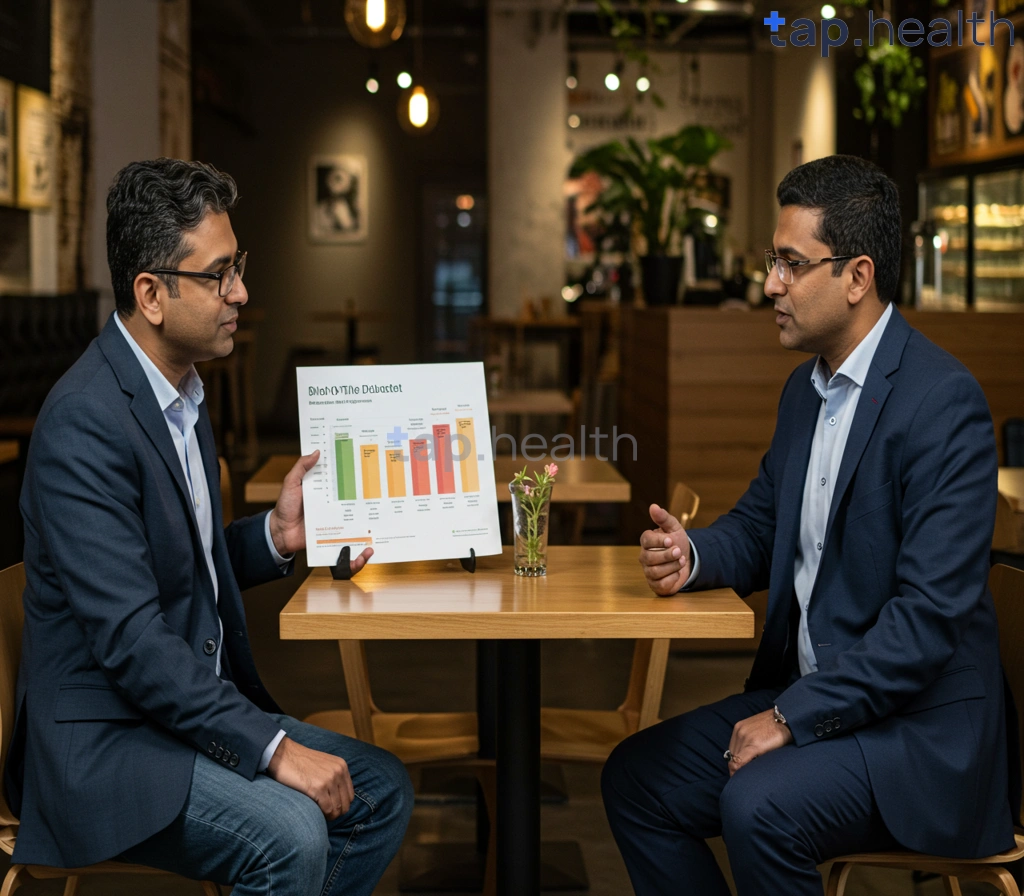Table of Contents
- Debunking Diabetes Diet Myths: A Quick Guide
- Diabetes-Friendly Diets: Fact vs. Fiction in 60 Seconds
- Are Fad Diets Safe for People with Diabetes?
- Top 5 Diabetes Diet Tips: Separating Hype from Help
- Quick Diabetes Diet Check: What Works, What Doesn’t?
- Frequently Asked Questions
- References
Living with diabetes can feel like navigating a minefield of conflicting information, especially when it comes to diet. Are those trendy fad diets promising quick fixes actually safe and effective, or are they just empty promises? We’re here to cut through the noise with Diabetes & Fad Diets: Separating Fact From Fiction in 60 Seconds. This blog post will quickly equip you with the knowledge to discern reliable dietary advice from dangerous misinformation, helping you make informed choices for better blood sugar management. Let’s debunk some myths and get you on the path to a healthier, happier life!
Debunking Diabetes Diet Myths: A Quick Guide
Shockingly, a staggering 50% of diabetes cases globally remain undiagnosed, according to the International Diabetes Federation. This highlights the urgent need for accurate information about diabetes management, especially concerning diet. Many fall prey to fad diets promising quick fixes, but these often worsen the condition. In India and tropical countries, where diabetes prevalence is high, understanding the facts is crucial.
Common Diabetes Diet Myths in India and Tropical Regions
Many believe that completely eliminating carbohydrates is the key to managing diabetes. However, this is misleading. Instead of drastic cuts, focusing on complex carbohydrates like whole grains, fruits, and vegetables is essential. Similarly, the belief that all sugars are equal is untrue. Natural sugars found in fruits are processed differently by the body compared to refined sugars in processed foods and sugary drinks. These should be limited. Another prevalent myth is that specific superfoods magically cure diabetes. While some foods offer beneficial nutrients, no single food can replace a balanced diet and medical supervision. Finally, many restrictive diets lead to nutrient deficiencies, potentially exacerbating health issues.
Actionable Steps for Healthy Eating with Diabetes
Prioritize whole, unprocessed foods; limit refined carbohydrates, sugars, and unhealthy fats. Consult a registered dietitian or diabetes educator for a personalized meal plan tailored to your needs and regional dietary habits. Remember, consistent, balanced eating is far more effective than any fad diet. In India and tropical countries, incorporating locally sourced fruits, vegetables, and whole grains can create a delicious and effective diabetes management plan. Seek guidance from healthcare professionals familiar with your region’s dietary landscape for the best results. Don’t let misleading information jeopardize your health; make informed choices today. For more tips on weight management, check out our guide on How to Lose Weight with Diabetes Diet Plan. And for a comprehensive overview of effective strategies, see our article on 10 Proven Tips for Effective Diabetes Management.
Diabetes-Friendly Diets: Fact vs. Fiction in 60 Seconds
Managing diabetes in hot, humid climates like those prevalent in India and other tropical countries presents unique challenges. Many fall prey to fad diets promising quick fixes, but these often neglect the crucial balance needed for effective diabetes management. The truth is, there’s no one-size-fits-all solution, but understanding the basics can make a world of difference.
Debunking the Myths:
One common misconception is that completely eliminating carbohydrates is the key. While reducing refined carbohydrates is important, completely cutting carbs is dangerous and can lead to nutrient deficiencies. Remember, your body needs carbohydrates for energy! A more sustainable approach involves focusing on complex carbohydrates found in whole grains, legumes, and vegetables. Generally, aiming for around 45–60 grams of carbs per meal, depending on your individual needs and activity level, is a good starting point. This advice should always be discussed with your doctor or a registered dietitian. For more information on different approaches, check out our article on Low-Carb vs. Moderate-Carb Diets for Diabetes: What Works Best?
Focusing on Facts:
Effective diabetes management in tropical regions involves incorporating plenty of fresh, seasonal fruits and vegetables. These are naturally rich in fiber, vitamins, and minerals, helping regulate blood sugar levels. Prioritizing whole grains over refined options, and choosing lean protein sources like fish and lentils, are also vital. Remember to stay hydrated, especially in warmer climates, as dehydration can impact blood sugar control. Spice up your meals with Indian herbs and spices known for their potential health benefits, but always maintain portion control. To discover some excellent food choices, explore our list of the 20 Best Foods for People with Diabetes – Tap Health.
Actionable Steps for Better Management:
Consult a healthcare professional or certified diabetes educator to create a personalized meal plan tailored to your specific needs and dietary preferences. Embrace the abundance of fresh, local produce available in your region. Learn to read food labels carefully, paying close attention to carbohydrate content. By making informed choices and prioritizing a balanced diet, you can successfully manage your diabetes and live a healthier, more fulfilling life.
Are Fad Diets Safe for People with Diabetes?
The allure of quick weight loss often leads individuals, especially those with diabetes, to embrace fad diets promising rapid results. However, these diets, often lacking in nutritional balance and sustainability, can be dangerous for people managing diabetes. Research shows a strong correlation between sugary beverage consumption and diabetes risk; daily consumption raises the risk by a significant 26%. This highlights the importance of focusing on long-term dietary changes rather than short-term fixes. This is especially important given the concerns surrounding other potentially harmful dietary approaches, such as those discussed in Can Fast Food Cause Diabetes?.
Understanding the Risks
Many fad diets severely restrict entire food groups, potentially leading to nutrient deficiencies crucial for managing blood sugar levels. For example, diets eliminating all carbohydrates, while seemingly effective for initial weight loss, can destabilize blood glucose control and cause dangerous complications in the long run. This is particularly relevant in Indian and tropical countries where many traditional diets incorporate healthy carbohydrates like rice and various legumes. Restricting these without careful planning and medical supervision can be detrimental. The complexities of different dietary approaches are further highlighted in Is Intermittent Fasting Safe for Diabetics?.
Safe and Sustainable Approaches
Instead of chasing quick fixes, focus on balanced, sustainable dietary changes. A diet rich in whole grains, fruits, vegetables, lean protein, and healthy fats, tailored to individual needs and preferences, is far more effective and safe for long-term diabetes management. Consulting a registered dietitian or diabetologist is crucial, particularly in tropical and Indian regions with diverse dietary traditions. They can help you create a personalized plan that incorporates culturally relevant foods while ensuring effective blood sugar control. Remember, sustainable lifestyle changes are far more impactful than temporary diet trends.
Taking Action
Don’t fall prey to misleading claims of quick fixes. Prioritize consulting a healthcare professional to develop a personalized diabetes management plan that works for your lifestyle and cultural context. This is particularly vital in regions like India and other tropical countries, where dietary habits and access to healthcare can vary significantly. Prioritizing your health through consistent, informed dietary choices is the key to managing diabetes effectively and living a healthier life.
Top 5 Diabetes Diet Tips: Separating Hype from Help
Understanding the Challenge
Managing diabetes, especially in tropical and Indian climates, requires a nuanced approach. The prevalence of diabetes is significant, with 61% of those living with the condition aged between 20-64 years, a crucial working-age demographic. This highlights the urgent need for practical, culturally relevant dietary advice that combats misinformation surrounding fad diets. Many popular diets, while promising quick fixes, often neglect the long-term health implications for individuals with diabetes in these regions.
Prioritize Whole Grains and Fiber
Focus on foods readily available in your region: Replace refined carbohydrates like white rice with whole grains like brown rice, millets (bajra, jowar, ragi), and oats. These are rich in fiber, helping regulate blood sugar levels and improve digestion. Include high-fiber fruits and vegetables common in your area, promoting satiety and preventing blood sugar spikes.
Manage Carbohydrate Intake Wisely
Don’t eliminate carbs entirely! Instead, choose complex carbohydrates over simple sugars. Simple carbs are found in processed foods and sugary drinks, causing rapid blood sugar increases. Complex carbs, found in whole grains and legumes, are digested more slowly. Portion control is key—consult a doctor or dietitian to determine your ideal carbohydrate intake based on your individual needs and activity level. For more in-depth guidance on effective diabetes management, check out 10 Proven Tips to Effectively Manage Diabetes | Simple Guide.
Embrace Spices and Herbs
Indian and tropical cuisines are rich in spices like turmeric, cinnamon, and ginger, known for their anti-inflammatory and blood sugar-regulating properties. Incorporate these into your meals regularly, adding flavour and potential health benefits. Remember, spices should complement a balanced diet, not replace it.
Hydration is Crucial
Staying hydrated is vital for overall health, especially in hot climates. Drink plenty of water throughout the day, and consider including hydrating fruits like watermelon and coconut water in your diet. Avoid sugary drinks, which can negatively impact blood sugar control. Avoiding common mistakes is crucial, and you can learn more about them in our article: 5 Common Mistakes People Make in Managing Diabetes.
Seek Professional Guidance
Finally, consult a healthcare professional or registered dietitian for personalized dietary advice tailored to your specific needs, health status, and cultural preferences. Don’t rely on fad diets; sustainable lifestyle changes are key to long-term diabetes management. Remember, managing diabetes effectively is a journey, not a race.
Quick Diabetes Diet Check: What Works, What Doesn’t?
Managing diabetes, especially in hot and humid climates prevalent across India and other tropical countries, requires a nuanced approach to diet. Many fad diets promise quick fixes, but understanding the science behind blood sugar control is crucial. A normal fasting blood sugar level is between 70–99 mg/dL. Prediabetes falls between 100–125 mg/dL, and a reading of 126 mg/dL or higher indicates diabetes. These ranges are important benchmarks to track your progress.
What Works: Sustainable Lifestyle Changes
Forget crash diets! Sustainable lifestyle modifications are key. Focus on a balanced diet rich in whole grains like brown rice and millets (popular in India), plenty of fresh, seasonal fruits and vegetables readily available in your region, and lean protein sources like lentils and fish. Regular physical activity, tailored to the climate, is equally crucial. Consider incorporating yoga or brisk walks in the cooler parts of the day to manage both blood sugar and heat. Prioritizing fiber-rich foods helps regulate blood sugar levels, preventing spikes and crashes.
What Doesn’t Work: The Allure of Fad Diets
Beware of extreme diets promising rapid weight loss. These often lead to nutrient deficiencies and can negatively impact your overall health, especially in already hot climates where hydration is critical. Diets that drastically restrict entire food groups, like carbohydrates or fats, are unsustainable and can harm your long-term health management. For example, eliminating all carbohydrates, while initially showing results, is not a long-term solution, and can be particularly detrimental in a culture that features carbohydrates in many staple foods. Prioritize a balanced approach and consult a doctor or registered dietitian for personalized guidance. If you’re concerned about prediabetes, check out our guide on Pre Diabetic Diet Chart: Simple Plans to Prevent Diabetes for helpful strategies.
Taking Action: Your Next Steps
In India and tropical regions, access to fresh, local produce is a major advantage. Use this to your benefit! Build a diabetes-friendly meal plan that incorporates locally sourced ingredients and traditional cooking methods. Seek advice from healthcare professionals familiar with the dietary needs of your region to create a personalized plan that suits your lifestyle and health needs. Remember, consistency is key to managing diabetes effectively. For more detailed dietary recommendations, explore our comprehensive Diet Chart for Diabetic Patients to Control Diabetes.
Frequently Asked Questions on Diabetes & Fad Diets: Separating Fact From Fiction in 60 Seconds
Q1. What are the dangers of fad diets for people with diabetes?
Fad diets often eliminate essential food groups, leading to nutrient deficiencies and unstable blood sugar levels, which can be very dangerous for people with diabetes. They rarely lead to sustainable weight loss.
Q2. What type of diet is recommended for managing diabetes?
A balanced diet is recommended, focusing on complex carbohydrates from whole grains, fruits, vegetables, and lean protein. Portion control and hydration are also key.
Q3. How important is it to consider regional foods and cultural context when planning a diabetes diet?
It’s very important! Your diet plan should incorporate regionally available, fresh produce and consider your cultural eating habits for better adherence and sustainability.
Q4. Should I consult a healthcare professional before starting any new diet plan for diabetes?
Absolutely. Consulting a registered dietitian or healthcare professional is crucial for creating a personalized plan that meets your individual needs and ensures your safety.
Q5. Why are sustainable lifestyle changes more effective than quick-fix diets for long-term diabetes management?
Temporary diets are often unsustainable and lead to yo-yo weight fluctuations. Sustainable lifestyle changes, including a balanced diet and regular exercise, are far more effective for long-term blood sugar control and overall health.
References
- A Practical Guide to Integrated Type 2 Diabetes Care: https://www.hse.ie/eng/services/list/2/primarycare/east-coast-diabetes-service/management-of-type-2-diabetes/diabetes-and-pregnancy/icgp-guide-to-integrated-type-2.pdf
- Your Guide to Diabetes: Type 1 and Type 2: https://www.niddk.nih.gov/-/media/Files/Diabetes/YourGuide2Diabetes_508.pdf




